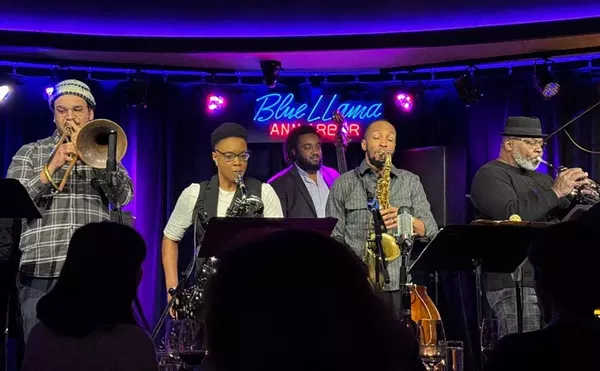Formed in 1995 from ex-members of San Diego hardcore bands Swing Kids and Struggle, the Locust has steadily drifted away from typical forms of “extreme” music, earning it the contempt of a supposedly open-minded audience.
In fact, some of those disapproving reactions to their newest release, Plague Soundscapes — out on Epitaph subsidiary label Anti records — prompted bassist/vocalist Justin Pearson to say, “I think a lot of people in the hardcore community are just so conservative. If you’re doing something different, you’re selling out, you’re doing something wrong. I don’t think we really did anything wrong. We’re still on an independent label, we’ve put out the best record that we’ve ever done, we didn’t tame our music. I think our music is more fucked up and more bizarre. Everyone’s a critic, and everyone’s an asshole, and for some reason they all have an opinion. I don’t think they know what they’re talking about.”
The band’s decision to sign with Epitaph, (a label scoffed at in the underground community for notoriously producing safe and fluffy punk rock) was something Pearson couldn’t be happier about. “We had this perception of the label, we said, ‘No, we’re not going to be on a label that sucks,’ [but] Brett [Gurewitz], the owner, is really an amazing guy. People don’t really see that side of Brett, they think, ‘Oh, he runs Epitaph, he’s in Bad Religion, he must be into shitty punk.’ I think he’s a genius. … It’s a great label, they’re really supportive of us, they’re totally open about our artistic creativity. They were like, ‘Do whatever you want.’”
One of the major benefits of signing with Anti was the budget the band received to record the album – it gave them unprecedented studio time. “Before, we were completely rushed,” says Pearson of the Locust’s 1999 self-titled LP that was recorded in a day and a half.
“[This time] we actually had time to execute it,” he says. “We spent two or three days just getting real good drum sounds.”
Plague Soundscapes is a mix of disease, discomfort and unethical science that will appeal to anyone with a taste for the bizarre and chaotic. Gabe Serbian (drums) and Robert Bray (guitar) create a foundation for Justin Pearson’s chicken-with-its-head-cut-off vocals, while Joseph Karam (keyboards) adds an eerie sterility to the mix, creating a heavy metal-cum-Nintendo game, stuck-in-a-blender sort of sound.
They can’t help it.
Pearson cites the Sex Pistols as a prime influence. “In retrospect, their music is pretty run-of-the-mill punk. [But] at the time they were definitely pushing lots of boundaries and had a lot of controversy going,” he says. “It was kind of a big ‘fuck you’ to music. That is something that I grew up on. Personally I am drawn toward that attitude in art … not, ‘I’m punk! I have a Mohawk!’”
When asked which recording artist in the history of music he would like to perform unnecessary surgery on, Pearson is disappointingly less nihilistic than he lets on. “You could eliminate an artist who really sucks, but you could eliminate an artist who’s threatening. I’d rather go and target the music industry or Clear Channel or something. They’re the ones that are creating all the turds in the market.”
Pearson elaborates on his disdain for the media trust: “We refuse to play Clear Channel shows, and it’s getting harder and harder on tour now. Smaller bands that are trying to get a break end up never getting out of their town. The whole music industry is just getting turned upside down.”
But just to be fair to the Locust’s detractors, you should all know that their catchy, family-oriented songs like “Anything Jesus does, I can do Better” “Solar Panel Asses” and “Recyclable Body Fluids in Human Shape” do seem ripe for Top 40 radio. Hah! You can practically hear the duet with Rob Thomas now. See you on TRL.
See the Locust on Thursday, Jan. 22, at St. Andrew’s Hall (431 E. Congress, Detroit) with Dillinger Escape Plan and The Oath. Call 313-961-MELT for more information.
Derek Schleelein is a freelance writer. E-mail [email protected].





